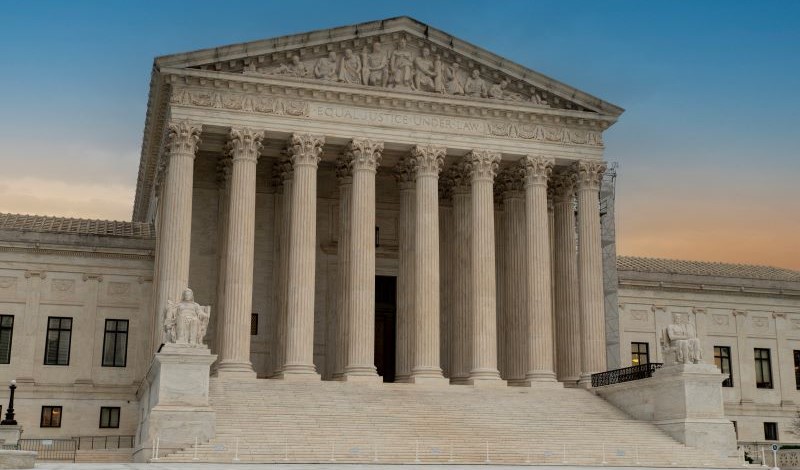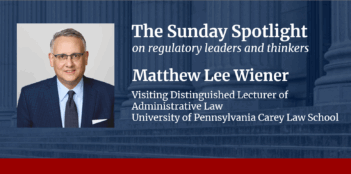
Scholars and practitioners examine the Court’s most important regulatory decisions of this past term.
The U.S. Supreme Court concluded its 2024–2025 term with decisions that reshaped aspects of administrative law, civil rights, and federal authority. Among the most consequential rulings were those defining the scope of regulatory power over the lives of individuals and businesses in the United States, including decisions involving the protection of transgender individuals from discrimination and the remedies available to those who challenge federal policies in the courts.
The term marked a series of significant victories for the Trump Administration. The Court also upheld a state law banning gender-affirming care for minors in a decision that may carry lasting implications for classifications based on sex or transgender status. In addition, the Court handed down other notable decisions addressing issues related to preventive care, gun control, veterans affairs, and immigration.
For the 11th consecutive year, The Regulatory Review is proud to publish its annual series of essays examining the Supreme Court’s regulatory decisions from the preceding term. This series brings together the work of leading legal scholars and practitioners to analyze the key rulings from the past term and to explore their implications for law, governance, regulatory policy, and individual rights.
The series features essays from the following contributors: Cary Coglianese, University of Pennsylvania Carey Law School; Laura Dolbow, University of Colorado Boulder Law School; Katie Eyer, Rutgers Law School; Daniel Farber, University of California, Berkeley, School of Law; Michael Herz, Cardozo School of Law; Allison K. Hoffman, University of Pennsylvania Carey Law School; Justin (Gus) Hurwitz, University of Pennsylvania Carey Law School; Katie Keith, Georgetown University Law Center; Ellen Kohler, University of Pennsylvania; Erika Lietzan, University of Missouri School of Law; Jud Mathews, Penn State Dickinson Law; Serena Mayeri, University of Pennsylvania Carey Law School; Anne Joseph O’Connell, Stanford Law School; Sarah Paoletti, University of Pennsylvania Carey Law School; Nabil Shaikh, J.D. University of Pennsylvania Carey Law School; Amanda Shanor, The Wharton School, University of Pennsylvania; Stacey-Rae Simcox, Stetson University College of Law; Andrew Twinamatsiko, Georgetown University Law Center; Michael Ulrich, Boston University School of Law; Matthew Lee Wiener, University of Pennsylvania Carey Law School; and Andrew Willinger, Duke Law School.
The Limits of Anti-Classification Doctrine in U.S. v. Skrmetti
July 14, 2025 | Katie Eyer, Rutgers Law School
The Supreme Court runs afoul of its own equal protection doctrine by ignoring explicit classifications.
How We Subsidize Care for Low-Income People
July 15, 2025 | Allison K. Hoffman, University of Pennsylvania Carey Law School
A Supreme Court decision reveals flaws in how we pay safety-net hospitals—and why reform is overdue.
A Missed Opportunity to Clarify NEPA Law
July 16, 2025 | Daniel A. Farber, University of California, Berkeley, School of Law
The Supreme Court narrows NEPA, leaving key questions unresolved.
The Price of Preserving Preventive Services Coverage
July 17, 2025 | Katie Keith and Andrew Twinamatsiko, Georgetown University Law Center
The Supreme Court preserves preventive services coverage but emboldens the HHS Secretary.
Recent E-Cigarette Decision Leaves Unanswered Questions
July 21, 2025 | Laura Dolbow, University of Colorado Boulder Law School
A unanimous Supreme Court clarifies the harmless error rule for agency action.
Nothing to See Here, Move Along
July 22, 2025 | Erika Lietzan, University of Missouri School of Law
The Supreme Court’s recent unanimous decision on FDA’s tobacco-authorization authority is utterly unremarkable.
VanDerStok and the Ghosts of Gun Deregulation
July 23, 2025 | Andrew Willinger, Duke Law School
The Supreme Court weighs public safety concerns surrounding ghost guns in a recent Second Amendment decision.
Expert Officers Under Political Supervision
July 24, 2025 | Anne Joseph O’Connell, Stanford Law School
The Supreme Court validates political control over public health decisions.
Shifting the Burden of Dirty Waters
July 28, 2025 | Ellen Kohler, University of Pennsylvania
A recent Supreme Court decision shifts responsibility for pollution prevention from polluters to EPA.
Access to Justice, Deferred and Denied
July 29, 2025 | Sarah Paoletti, University of Pennsylvania Carey Law School
The Supreme Court limits judicial remedies and increases deference to executive power in immigration enforcement.
Consistently Inconsistent
July 30, 2025 | Michael Ulrich, Boston University School of Law
Two recent Supreme Court decisions present conflicting perspectives on “ghost guns.”
Will Ignoring the Pro-Veteran Canon Make It Go Away?
July 31, 2025 | Stacey-Rae Simcox, Stetson University College of Law
The Supreme Court’s refusal to strengthen protections for veterans will have a lasting impact.
Trans Rights and the Future of Sex Discrimination Law
August 4, 2025 | Serena Mayeri and Amanda Shanor, University of Pennsylvania
The Supreme Court considers how the equal protection doctrine applies to transgender individuals.
Venue in Clean Air Act Challenges
August 5, 2025 | Michael Herz, Cardozo School of Law
Two recent Supreme Court decisions identify in which court EPA decisions can be challenged.
Constitutional Continuity in a Time of Change
August 6, 2025 | Jud Mathews, Penn State Dickinson Law
The Supreme Court rejects a nondelegation challenge to the FCC’s power to set universal service fees.
A Merits Non-Dodge
August 7, 2025 | Nabil Shaikh, J.D., University of Pennsylvania Carey Law School
The Supreme Court sides with the Nuclear Regulatory Commission on procedural grounds but signals support for its licensing authority.
Lessons for Deference From the Telephone Consumer Protection Act
August 7, 2025 | Justin (Gus) Hurwitz, University of Pennsylvania Carey Law School
The Supreme Court reinforces and expands its 2024 ruling in Loper Bright.
Judicial Remedies After CASA
August 11, 2025 | Cary Coglianese and Matthew Lee Wiener, University of Pennsylvania Carey Law School
After the Supreme Court tamps down on nationwide injunctions, future pathways and questions still remain.



